Dignified Transfer Ceremony ~ Press Intrusion Begins





 An Air Force Mortuary Affairs Operations Center carry team transfers the remains of Air Force Staff Sgt. Phillip A. Myers, of Hopewell, Va., at Dover Air Force Base, Del., April 5. Sergeant Myers died April 4 near Helmand Province, Afghanistan, from wounds suffered from an improvised explosive device. He was assigned to the 48th Civil Engineer Squadron, Royal Air Force Lakenheath, United Kingdom. Sergeant Myers' family is the first to allow media to cover the dignified transfer under the new Department of Defense policy.
An Air Force Mortuary Affairs Operations Center carry team transfers the remains of Air Force Staff Sgt. Phillip A. Myers, of Hopewell, Va., at Dover Air Force Base, Del., April 5. Sergeant Myers died April 4 near Helmand Province, Afghanistan, from wounds suffered from an improvised explosive device. He was assigned to the 48th Civil Engineer Squadron, Royal Air Force Lakenheath, United Kingdom. Sergeant Myers' family is the first to allow media to cover the dignified transfer under the new Department of Defense policy.U.S. Air Force photo/Roland Balik
The "Dignified Transfer Ceremony" Policy
A solemn dignified transfer of remains is conducted upon arrival at Dover Air Force Base, Deleware, from the aircraft to a transfer vehicle to honor those who have given their lives in the service of our country. The vehicle then moves the fallen to the Port Mortuary.
A dignified transfer is the process by which, upon the return from the theater of operations to the United States, the remains of fallen military members are transferred from the aircraft to a waiting vehicle and then to the Port Mortuary. The dignified transfer is not a ceremony; rather, it is a solemn movement of the transfer case by a carry team of military personnel from the fallen member's respective service. A dignified transfer is conducted for every U.S. military member who dies in the theater of operation while in the service of their country. A senior ranking officer of the fallen member's service presides over each dignified transfer.
The sequence of the dignified transfer starts with the fallen being returned to Dover by the most expedient means possible, which may mean a direct flight from theater, or a flight to Ramstein Air Base, and then to Dover. It is the Department of Defense's policy, and AFMAO's mission, to return America's fallen to their loved ones as quickly as possible. Once the aircraft lands at Dover, service-specific carry teams remove the transfer cases individually from the aircraft and move them to a waiting mortuary transport vehicle. Once all of the transfer cases have been taken to the transport vehicles, they are then taken to the Port Mortuary.
***************************************
President Obama ordered the DOD to write a policy that allowed the press to intrude upon these solemn ceremonies. This ended the policy of privacy instituted by President George H W Bush during the first Gulf War. Last night, the first of these press covered events occured.
I have never understood the point of the press being at ramp ceremonies in Iraq or Afghanistan or Kuwait or any other country, nor have I undersood their 'need' to photograph the arrival of the fallen at Dover.
I read all of the press reports found on the internet. The only pictures I found were identical to these taken by an Air Force PAO, but CNN did video tape it. Little, if anything, was written about the soldier who was being returned.
I have never understood the point or the necessity of making a family's personal moment a photo opportunity. I never believed that they needed it to tell the story. I never believed that one flag draped coffin looked any different than any other flag draped coffin. And, the press proved me right that it is not about the person who died, it is about the pictures. Not one of the press reports mentioned anything about who SSG Myers was.
All it takes is one read of a soldiers description of a ramp ceremony to know about the honor that is given to a fallen warrior. Those stories can never be told in a picture.
The anti-war crowd yammers that not seeing them hides 'the true cost of war' - really? Without a coffin, you don't believe that the obituaries and life stories are real? Why don't you go to the actual funeral if you want to see the real cost of war on a family and a community - not to mention the coffin?
I have never heard one good reason why the press should be at Dover for the return.
I have, however, been contacted by more than a handful of soldiers who have said, "If I die, promise me that you will make sure that my family doesn't let those press people in." I can't help but wonder why the soldier wasn't given the opportunity to decide in the myriad of papers that they fill out when they deploy. While the policy now allows the family to decide if the press will be there, every decision a family has to make about 'what would they have wanted' just adds to the grief. And, family opinions often do NOT reflect the soldiers opinions.
To read about the soldier who returned home last night, please read here:
http://gazingattheflag.blogspot.com/2009/04/farewell-walk-with-god-ssg-phillip.html
I have never understood the point of the press being at ramp ceremonies in Iraq or Afghanistan or Kuwait or any other country, nor have I undersood their 'need' to photograph the arrival of the fallen at Dover.
I read all of the press reports found on the internet. The only pictures I found were identical to these taken by an Air Force PAO, but CNN did video tape it. Little, if anything, was written about the soldier who was being returned.
I have never understood the point or the necessity of making a family's personal moment a photo opportunity. I never believed that they needed it to tell the story. I never believed that one flag draped coffin looked any different than any other flag draped coffin. And, the press proved me right that it is not about the person who died, it is about the pictures. Not one of the press reports mentioned anything about who SSG Myers was.
All it takes is one read of a soldiers description of a ramp ceremony to know about the honor that is given to a fallen warrior. Those stories can never be told in a picture.
The anti-war crowd yammers that not seeing them hides 'the true cost of war' - really? Without a coffin, you don't believe that the obituaries and life stories are real? Why don't you go to the actual funeral if you want to see the real cost of war on a family and a community - not to mention the coffin?
I have never heard one good reason why the press should be at Dover for the return.
I have, however, been contacted by more than a handful of soldiers who have said, "If I die, promise me that you will make sure that my family doesn't let those press people in." I can't help but wonder why the soldier wasn't given the opportunity to decide in the myriad of papers that they fill out when they deploy. While the policy now allows the family to decide if the press will be there, every decision a family has to make about 'what would they have wanted' just adds to the grief. And, family opinions often do NOT reflect the soldiers opinions.
To read about the soldier who returned home last night, please read here:
http://gazingattheflag.blogspot.com/2009/04/farewell-walk-with-god-ssg-phillip.html



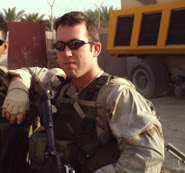










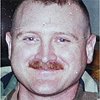












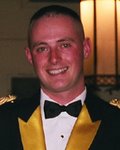






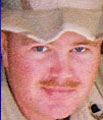
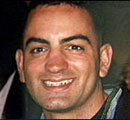





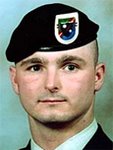




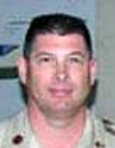
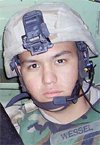
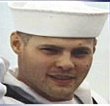





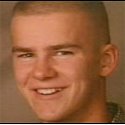
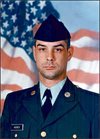


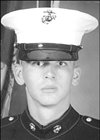
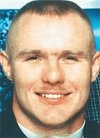







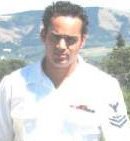

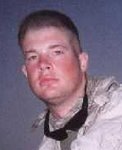
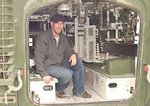
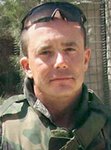



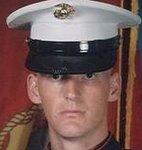
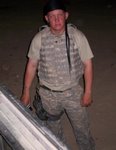
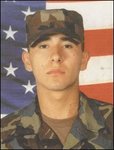
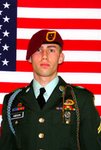

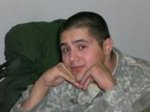
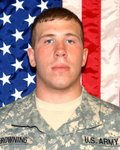






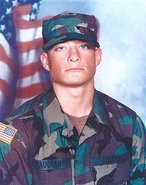
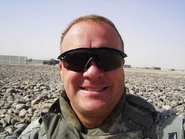
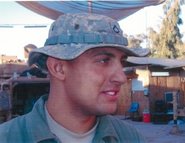

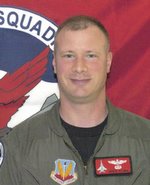
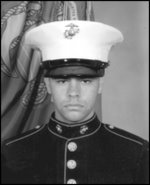
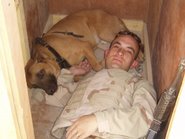
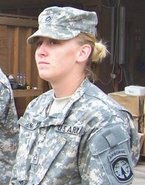

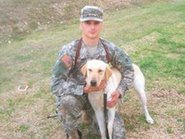

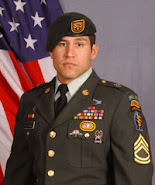

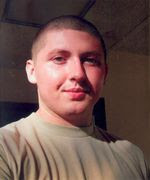



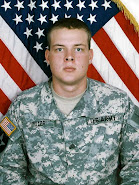
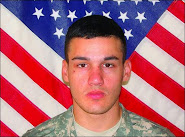



7 comments:
It is a diginified ceremony but I do not like the press there, wait to see what the dail kos will do with the photos. I have flown on a C141 from Siagon to Okinawa with 4 pallets of 12 coffins each, sad but it is part of war, should not be in the press.
Sarge -
I couldn't agree more...
The families of these heroes were those who decided whether there should be press coverage allowed. Just the facts.
Anonymous - Thank you for your VAPID comment. Obviously you can not read. The comment policy states NO Anonymous comments and the piece says EXACTLY what your comment says, plus a lot more. I am sorry you are illiterate and unable to read the policy and the piece.
"Just the facts" - there are many more facts than you listed. Too bad you did not read the piece or have anything worthwhile to contribute or the honor to sign your name.
As a Vietnam veteran, I disagree with comment, "press should not be there."
True, something should be written about the individ in the coffin, but the image of the Dignified Transfer speaks volumes.
War is war and death is the ultimate consequence. The public has to be made aware of this. "a picture says a thousand words."
thank you
Jay Hirsch
Vietnam 1968/69
Jay-
Thank you for your opinion.
BUT - no where in the piece does it say "press should not be there."
What it says is, I have yet to hear a good reason why they need to be there. Notice that they no longer go or report on these. Once they got their way, they were no longer interested in the IMAGE - of course, maybe it is dependent upon who the President is at the time. The entire point was to bash a President.
The press you admire so much is not covering two months with the highest death toll in Afghanistan, either - they aren't covering Afghanistan at all.
The public should be more aware of lots of things. But, the American public is lazy and selfish. I would rather err on the side of respecting and honoring the individual than in waving photos around.
Post script to Jay --
During Vietnam, I used to sit and watch luggage trains chug across the tarmac filled with caskets from Vietnam. As anti-war as the country was, the press didn't show that either, and it was a powerful message.
I believe, the press only wanted to do this because they had been told they couldn't. Otherwise, why did the coverage stop?
Post a Comment